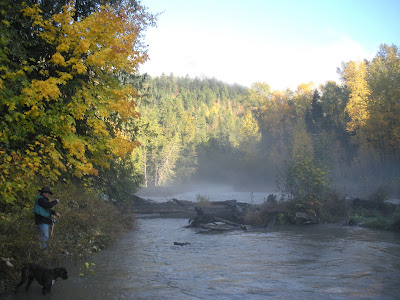
It was another tough week in the news. The latest Department of Fish and WildlIfe 2010 sport fishing proposals came out. Translating the fishing laws into English is an inexact science. Today's fishing laws may require an attorney to understand them. If you cannot afford an attorney, then you probably can't afford to go fishing. An activity that Peninsula Daily News sports writer Matt Schubert observed in his Oct. 16, 2009 column, that’s like "throwing your wallet in the river." He understands the value of the sport fishing industry on the North Olympic Peninsula.
River fishing is cheap compared to first throwing your money in a boat so you can throw your wallet in the salt chuck.
That's nothing compared to being a tourist and having to pay for everything from ferry tickets to speeding tickets just to get here and throw your wallet in the water. It all adds up to make a sport caught salmon worth many hundreds of dollars per pound even if it doesn't get caught. Our nation's fishing laws are designed to ensure that future generations will have an opportunity to fish and not catch anything, no matter how much it costs.
My earliest research suggested the fishing laws are a sort of primitive code that may have been written with a Ouija board. That was wrong. The fishing laws are written with public input. That, with the expert testimony of bought-and-paid-for biologists and the plundering rhetoric of greed-bloated pressure groups, stacks the deck for an anonymous staff of self-serving career opportunists, who spin a roulette wheel located somewhere in the basement of the capitol building. Each spin of the wheel sets a season or a limit somewhere for competing sport, tribal and commercial fishing groups, who must abide by the terms of the Boldt Decision. It divides the harvestable catch between the tribal and non-tribal fisheries. If one side fails to harvest their share of the catch, the other side can take advantage of this lost opportunity. In English, that means every fish a sports angler catch and releases means another fish for the tribes to catch and sell.
The latest barrage of rules is part of a three-step system designed to eliminate sport fishing by:
1. Imposing selective gear catch and release sport fishing rules where you can only keep a hatchery fish with a clipped adipose fin while 2. Leaving the same water open to a non-selective commercial harvest that takes advantage of sports fishing's "lost opportunity" to increase their harvest of unclipped fish and 3. The elimination of the fish hatcheries that produce the clipped finfish. They are the only fish sport anglers can keep.
To see how well the system works, we need look no further than the Dungeness, a river with two fish hatcheries closed to fishing most of the year. The Dungeness used to be so full of salmon you could throw a rock in the river and just grab the fish that spooked up on shore. People used to catch thousands of steelhead every year out of the Dungeness. With the miracle of modern fisheries management, three steelhead returned to the Dungeness fish hatchery last year. Meanwhile, the Dungeness spring Chinook, chum, pink salmon, bull trout, Sockeye and Lamprey eel are threatened, endangered or just plain gone.


No comments:
Post a Comment